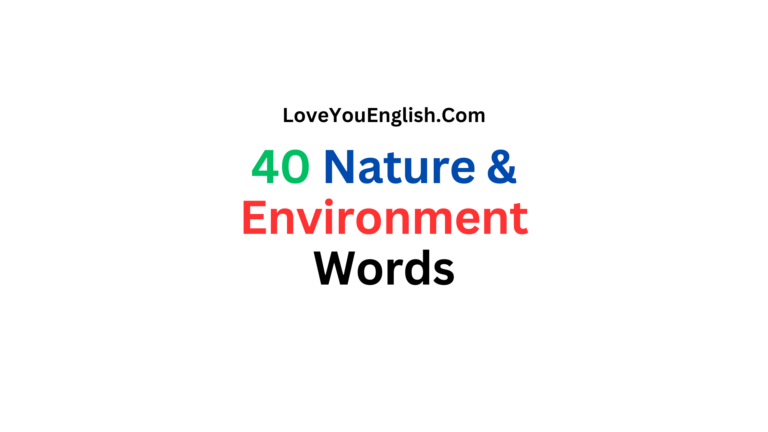40 Science & Innovation-Related English Words with Meanings
Science and innovation are always moving forward, bringing new ideas and discoveries into our world.
To understand these exciting changes, it’s helpful to know some keywords and what they mean.
This list of 40 science and innovation terms will give you a good starting point to learn about important concepts in these fields.
Here’s a list of 40 science and innovation-related words with their meanings.
I hope you find it interesting and helpful!
Hypothesis – A testable idea or explanation for something observed in the natural world.
Theory – A well-substantiated explanation of an aspect of the natural world based on a body of evidence.
Experiment – A procedure carried out to test a hypothesis or explore a scientific question.
Data – Facts or information collected through observation or experimentation.
Observation – The act of noting and recording something with instruments or senses.
Variable – A factor or condition that can be changed and tested in an experiment.
Innovation – The creation of new methods, ideas, or products to solve problems or improve things.
Invention – A novel device, method, or process developed to solve a specific problem.
Prototype – An early model of a product used to test and refine its design.
Research – Systematic investigation to establish facts and reach new conclusions.
More vocabulary:
- Advanced Adjectives for Describing People
- 5 English slang terms you need to know in 2024
- How to Expand Your English Vocabulary Fast
- 29 Slang Words You Need to Know
- How to Build English Vocabulary: 10 Tips for Success
Discovery – Finding something new that was previously unknown or unrecognized.
Technology – The application of scientific knowledge for practical purposes.
Sustainability – The ability to maintain processes or resources over the long term without depleting them.
Engineering – The use of scientific principles to design and build structures, machines, or systems.
Biotechnology – The use of living organisms or biological systems to develop products and technologies.
Algorithm – A step-by-step procedure or formula for solving a problem or performing a task.
Simulation – A method of imitating real-world processes or systems to study their behavior.
Nanotechnology – The science of manipulating materials on an atomic or molecular scale.
Genetics – The study of heredity and variation in organisms through genes.
Quantum Mechanics – A branch of physics dealing with phenomena at very small scales, like atoms and particles.
Robotics – The design, construction, and use of robots for various tasks.
Artificial Intelligence (AI) – The simulation of human intelligence in machines programmed to think and learn.
Renewable Energy – Energy from sources that are naturally replenished, like solar or wind power.
Genome – The complete set of genes or genetic material in an organism.
Climate Change – Long-term changes in temperature and weather patterns, often attributed to human activities.
Pharmacology – The science of drugs and their effects on the body.
Astrobiology – The study of the origin, evolution, and possibility of life beyond Earth.
Robotics – The field of designing and building robots to perform tasks autonomously.
Materials Science – The study of materials and their properties for various applications.
Bioengineering – The application of principles from biology and engineering to develop new technologies.
Cybersecurity – Measures and techniques used to protect computers, networks, and data from attacks.
Astronomy – The study of celestial objects and phenomena beyond Earth’s atmosphere.
Ecology – The study of interactions between organisms and their environment.
Mathematics – The abstract science of numbers, quantities, and shapes and their relationships.
Neuroscience – The study of the nervous system and brain function.
Space Exploration – The investigation of outer space through manned missions, satellites, and telescopes.
Chemistry – The science of substances, their properties, reactions, and the changes they undergo.
Microbiology – The study of microscopic organisms, like bacteria and viruses.
Computational Science – The use of computers to model and solve complex scientific problems.
Ethics – The study of moral principles guiding scientific research and technological development.
Conclusion:
Learning these 40 science and innovation words can open up a whole new world of understanding.
Whether you’re a student, a curious person, or someone who wants to keep up with the latest developments, knowing these terms will help you make sense of the amazing advances happening all around us.
Remember, science and innovation are always changing, so keep exploring and learning!
How to remember words in an easy way
To remember vocabulary well, try different methods that suit how you learn.
-Begin with flashcards for practicing words over and over.
-Use new words in sentences and talks to get more comfortable with them.
-Pictures can help you remember words better.
-Also, learn words in stories or while listening to help you remember how to use them.
-Keep reviewing and practicing and connect new words to ones you already know.
These tricks will help you remember and use new words better.







